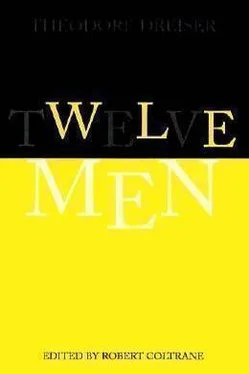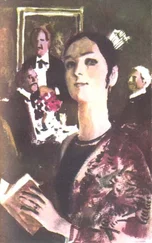Теодор Драйзер - Twelve Men
Здесь есть возможность читать онлайн «Теодор Драйзер - Twelve Men» весь текст электронной книги совершенно бесплатно (целиком полную версию без сокращений). В некоторых случаях можно слушать аудио, скачать через торрент в формате fb2 и присутствует краткое содержание. Год выпуска: 2014, Издательство: epubBooks Classics, Жанр: Биографии и Мемуары, на английском языке. Описание произведения, (предисловие) а так же отзывы посетителей доступны на портале библиотеки ЛибКат.
- Название:Twelve Men
- Автор:
- Издательство:epubBooks Classics
- Жанр:
- Год:2014
- ISBN:нет данных
- Рейтинг книги:4 / 5. Голосов: 1
-
Избранное:Добавить в избранное
- Отзывы:
-
Ваша оценка:
- 80
- 1
- 2
- 3
- 4
- 5
Twelve Men: краткое содержание, описание и аннотация
Предлагаем к чтению аннотацию, описание, краткое содержание или предисловие (зависит от того, что написал сам автор книги «Twelve Men»). Если вы не нашли необходимую информацию о книге — напишите в комментариях, мы постараемся отыскать её.
Twelve Men — читать онлайн бесплатно полную книгу (весь текст) целиком
Ниже представлен текст книги, разбитый по страницам. Система сохранения места последней прочитанной страницы, позволяет с удобством читать онлайн бесплатно книгу «Twelve Men», без необходимости каждый раз заново искать на чём Вы остановились. Поставьте закладку, и сможете в любой момент перейти на страницу, на которой закончили чтение.
Интервал:
Закладка:
"Misha Rook! Misha Rook!" I heard him say, as they bore the body in; and when they carried it out of the church, he followed, head down. As they lowered it to the grave he was inconsolable.
"Misha Rook! Misha Rook! I work–a for him fifteen year!"
A Mayor and His People
Here is the story of an individual whose political and social example, if such things are ever worth anything (the moralists to the contrary notwithstanding), should have been, at the time, of the greatest importance to every citizen of the United States. Only it was not. Or was it? Who really knows? Anyway, he and his career are entirely forgotten by now, and have been these many years.
He was the mayor of one of those dreary New England mill towns in northern Massachusetts—a bleak, pleasureless realm of about forty thousand, where, from the time he was born until he finally left at the age of thirty–six to seek his fortune elsewhere, he had resided without change. During that time he had worked in various of the local mills, which in one way and another involved nearly all of the population. He was a mill shoe–maker by trade, or, in other words, a factory shoe–hand, knowing only a part of all the processes necessary to make a shoe in that fashion. Still, he was a fair workman, and earned as much as fifteen or eighteen dollars a week at times—rather good pay for that region. By temperament a humanitarian, or possibly because of his own humble state one who was compelled to take cognizance of the difficulties of others, he finally expressed his mental unrest by organizing a club for the study and propagation of socialism, and later, when it became powerful enough to have a candidate and look for political expression of some kind, he was its first, and thereafter for a number of years, its regular candidate for mayor. For a long time, or until its membership became sufficient to attract some slight political attention, its members (following our regular American, unintellectual custom) were looked upon by the rest of the people as a body of harmless kickers, filled with fool notions about a man's duty to his fellowman, some silly dream about an honest and economical administration of public affairs—their city's affairs, to be exact. We are so wise in America, so interested in our fellowman, so regardful of his welfare. They were so small in number, however, that they were little more than an object of pleasant jest, useful for that purpose alone.
This club, however, continued to put up its candidate until about 1895, when suddenly it succeeded in polling the very modest number of fifty–four votes—double the number it had succeeded in polling any previous year. A year later one hundred and thirty–six were registered, and the next year six hundred. Then suddenly the mayor who won that year's battle died, and a special election was called. Here the club polled six hundred and one, a total and astonishing gain of one. In 1898 the perennial candidate was again nominated and received fifteen hundred, and in 1899, when he ran again, twenty–three hundred votes, which elected him.
If this fact be registered casually here, it was not so regarded in that typically New England mill town. Ever study New England—its Puritan, self–defensive, but unintellectual and selfish psychology? Although this poor little snip of a mayor was only elected for one year, men paused astounded, those who had not voted for him, and several of the older conventional political and religious order, wedded to their church and all the routine of the average puritanic mill town, actually cried. No one knew, of course, who the new mayor was, or what he stood for. There were open assertions that the club behind him was anarchistic—that ever–ready charge against anything new in America—and that the courts should be called upon to prevent his being seated. And this from people who were as poorly "off" commercially and socially as any might well be. It was stated, as proving the worst, that he was, or had been, a mill worker!—and, before that a grocery clerk—both at twelve a week, or less!! Immediate division of property, the forcing of all employers to pay as much as five a day to every laborer (an unheard–of sum in New England), and general constraint and subversion of individual rights (things then unknown in America, of course), loomed in the minds of these conventional Americans as the natural and immediate result of so modest a victory. The old–time politicians and corporations who understood much better what the point was, the significance of this straw, were more or less disgruntled, but satisfied that it could be undone later.
An actual conversation which occurred on one of the outlying street corners one evening about dusk will best illustrate the entire situation.
"Who is the man, anyway?" asked one citizen of a total stranger whom he had chanced to meet.
"Oh, no one in particular, I think. A grocery clerk, they say."
"Astonishing, isn't it? Why, I never thought those people would get anything. Why, they didn't even figure last year."
"Seems to be considerable doubt as to just what he'll do."
"That's what I've been wondering. I don't take much stock in all their talk about anarchy. A man hasn't so very much power as mayor."
"No," said the other.
"We ought to give him a trial, anyway. He's won a big fight. I should like to see him, see what he looks like."
"Oh, nothing startling. I know him."
"Rather young, ain't he?"
"Yes."
"Where did he come from?"
"Oh, right around here."
"Was he a mill–hand?"
"Yes."
The stranger made inquiry as to other facts and then turned off at a corner.
"Well," he observed at parting, "I don't know. I'm inclined to believe in the man. I should like to see him myself. Good–night."
"Good–night," said the other, waving his hand. "When you see me again you will know that you are looking at the mayor."
The inquirer stared after him and saw a six–foot citizen, of otherwise medium proportions, whose long, youthful face and mild gray eyes, with just a suggestion of washed–out blue in them, were hardly what was to be expected of a notorious and otherwise astounding political figure.
"He is too young," was the earliest comments, when the public once became aware of his personality.
"Why, he is nothing but a grocery clerk," was another, the skeptical and condemnatory possibilities of which need not be dilated upon here.
And he was, in his way—nothing much of a genius, as such things go in politics, but an interesting figure. Without much taste (or its cultivated shadow) or great vision of any kind, he was still a man who sensed the evils of great and often unnecessary social inequalities and the need of reorganizing influences, which would tend to narrow the vast gulf between the unorganized and ignorant poor, and the huge beneficiaries of unearned (yes, and not even understood) increment. For what does the economic wisdom of the average capitalist amount to, after all: the narrow, gourmandizing hunger of the average multi–millionaire?
At any rate, people watched him as he went to and fro between his office and his home, and reached the general conclusion after the first excitement had died down that he did not amount to much.
When introduced into his office in the small but pleasant city hall, he came into contact with a "ring," and a fixed condition, which nobody imagined a lone young mayor could change. Old–time politicians sat there giving out contracts for street–cleaning, lighting, improvements and supplies of all kinds, and a bond of mutual profit bound them closely together.
"I don't think he can do much to hurt us," these individuals said one to another. "He don't amount to much."
The mayor was not of a talkative or confiding turn. Neither was he cold or wanting in good and natural manners. He was, however, of a preoccupied turn of mind, "up in the air," some called it, and smoked a good many cigars.
Читать дальшеИнтервал:
Закладка:
Похожие книги на «Twelve Men»
Представляем Вашему вниманию похожие книги на «Twelve Men» списком для выбора. Мы отобрали схожую по названию и смыслу литературу в надежде предоставить читателям больше вариантов отыскать новые, интересные, ещё непрочитанные произведения.
Обсуждение, отзывы о книге «Twelve Men» и просто собственные мнения читателей. Оставьте ваши комментарии, напишите, что Вы думаете о произведении, его смысле или главных героях. Укажите что конкретно понравилось, а что нет, и почему Вы так считаете.









